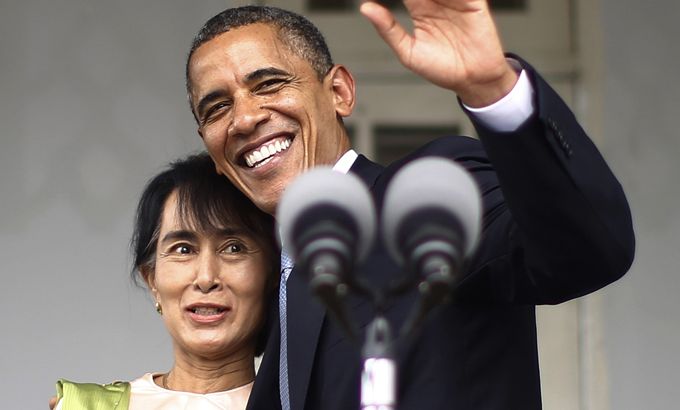
Is it too soon for the US to embrace Myanmar?
We probe why US diplomacy has gone on the charm offensive as Obama rewards former ‘outpost of tyranny’ with a visit.
President Barack Obama’s historic visit to Myanmar is questioned after he becomes the first US President to visit Myanmar. Are regional influence and trade the real reason for the trip?
|
“The pace of economic reforms since the beginning of the year have been breathtaking …. There will be a lot of interest from international oil companies in developing leases. The suspension of economic sanctions by Western democracies now allow Western oil companies to also compete for these.“ – Rajiv Biswas, IHS Global Insight |
Now, the country that not so long ago was considered an international outcast and described by former US president George W Bush as an “outpost of tyranny” is being offering a hand of friendship by the White House.
The visit is the centrepiece of a four-day trip by the recently re-elected statesman to Southeast Asia that will end in a key summit in Cambodia.
Myanmar has the world’s 10th-largest natural gas reserves, making it the region’s major natural gas exporter. It is also home to enormous rice yields, gold, coal and oil.
Obama urged Myanmar to hasten what he called its “remarkable reforms” – but also spoke of incredible development opportunities.
Change has been slowly been taking hold in the country.
- The first elections in 20 years were held in November 2010, marking the transition towards democracy. But they were boycotted by the main pro-democracy party, and condemned as a sham
“ I don’t really think it is a very right time for him to visit, but of course he is already there. If the tangible results and authentic changes that we are looking for is happening in the next two years then of course we can judge Obama’s trip as a worthy trip.“
– Myra Dahgaypaw, US Campaign for Burma
- The big breakthrough came a week later when opposition leader Aung San Suu Kyi was released from house arrest – having been detained for most of the preceding 20 years
- By March 2011, the transfer of power to the nominally civilian government was complete, and Thein Sein was sworn in as president
- By October, a general amnesty saw the release of more than 200 political prisoners.
- And in April of this year, Suu Kyi’s National League for Democracy party won 43 out of 45 seats in landmark parliamentary by-elections, generally seen as free and fair.
Meanwhile, China, the regional superpower, has played down President Obama’s trip to Myanmar, saying the two Asian nations had strong ties. Fu Ying, Chinese vice foreign minister, said: “We believe the US is not here to threaten China, and China has no intention to pose a threat to the US.”
Aung San Suu Kyi praised president Obama’s support for the changes in Myanmar, but warned: “We have to be very careful that we are not lured by a mirage of success and that we are working towards genuine success for our people.”
That statement follows a new foreign investment law in Myanmar, which will allow overseas firms to fully own ventures and offers tax breaks and lengthy land leases, state media has reported.
So is President Obama trying to reassert US influence and policy in Southeast Asia? And is it too early to reward a country still shrugging off decades of repressive military rule?
Inside Story, with presenter Shiulie Ghosh, discusses with guests: Priscilla Clapp, a senior adviser with the Asia Society and the former chief of mission at the US embassy in Myanmar; Myra Dahgaypaw, the co-ordinator for the US campaign for Burma, which represents the internally displaced people of Myanmar; and Rajiv Biswas, chief economist for IHS Global Insight, he writes on trade relations in the Asia-Pacific region.